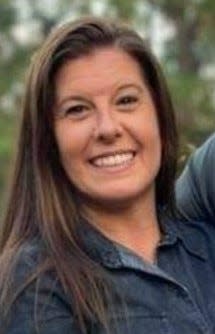Remember when schools didn't have the Internet? Oh, how times have changed, educators say
Technology is one of the biggest changes that long-time employees in education have seen over the decades.
Two local school district employees recently reflected on their years in education, how it has changed and what their fondest memories are − as students head back to class for the 2023-2024 school year.
Here's what they had to say:
South Western School District

Doug Greenholt
Years with the district: 30
Title: Director of Technology
Other tidbits: Previously coached basketball in the district for 20 years; his wife, Diane Greenholt, retired as the high school librarian, and his daughter, Natalie Bhut, is a speech language pathologist at West Manheim Elementary School.
Q. How has education changed over the years?
A. I can tell you how technology has changed in education. ... When I got here, there was not much of anything: no email, no Internet. We had two isolated computer labs in the middle school and two in the high school, and the offices had these old desktops. That was it.
Shortly after that, through some grant, we got email. We got a few email accounts; we spun up an email server; we all ran Eudora and slowly got it out to the staff. We had to create networks. We put desktops in the classrooms for the teacher. Laptops weren't a thing at that point in '94 and '95.
Now we're full one to one: Every kid has a Chromebook, every teacher has a laptop. We have wireless throughout every building. Our buildings are connected together. We have a connection out to Lincoln Intermediate Unit for the Internet. All of the schools in York, Adams and Franklin counties work with them to get our Internet connection.
It's crazy where this has all come.
For the kids, they (started with) typing lab where they did little educational things. We built up in the elementary schools. We put four computers in every classroom. We built more labs, and over time, we were trying to make this work and then here comes the laptops. ... The price point got to a point where we could make it work instead of cycling all the labs, redirect this money and be smart about it and we can put a laptop in most kids' hands.
Then COVID hit, and we had to get laptops in every kid's hands. We were really close, fortunately. We got every kid a Chromebook. We got every teacher a laptop, and we had to make everything work at home.
Now the big thing is cybersecurity. The bad guys are getting smarter. We do so much here to try to train our staff on good email versus bad email, and how to recognize it. They're doing a great job with it.
AI is another huge thing coming down the road. We're still trying to figure that out. It's not going anywhere, so how do we use it for good? How do our teachers leverage that in the classroom? How do we teach the kids how to use it in a responsible way?
Q. Why have you decided to remain in education for many years?
A. When I was in banking, it was cut throat. The other bank across the street was your enemy, and you're trying to pull customers in. You're trying to do better than them.
Here, it's very collaborative. We're all teaching kids. That's the biggest thing: What's best for the kids? It's kids first, always, and we try to tailor everything we do to that. That's the one thing that I like about education.
I have a great team here with our administrative team. The school board and teachers are fantastic. It's a great group to work with. That's why I have been here so long.
Q. What is your fondest memory of being in education?
A. It's helping the kids out. We hand out the Chromebooks to incoming ninth graders, and seeing them and working with them, it's neat.
I coached for 20 years.
It's why you do it. You don't do it for the pay.
They're there to try to learn and get better, and it's neat to do that.
First day of school: It's time for students to head back to class. Here's when schools in York County open.
South Eastern School District

Jennifer Adams
Years with the district: Starting her 24th year (and an alumna of Kennard-Dale High School)
Teaches: U.S. studies and psychology. She also teaches a college course of psychology for the University of Pittsburgh
Other fun facts: She formerly coached cheerleading in the Southern York County School District while she was in college.
Q. How has education changed over the years?
There are a lot of changes, some good, some bad. I would definitely say when I say this. Kids have definitely changed, but fundamentally kids are still where they were before. They need loving, caring adults that are going to try to mentor them and get them where they need to go. Probably the biggest change that I have seen is with technology and how it has really impacted, how we teach, how the kids learn.
I'm grateful for some of the things, but some of the things that I think definitely have taken their tolls on the kids, especially with social media and cell phones in the classrooms. It's almost like a double-edged sword. Like you can have some really good aspects to where the kids almost have like a computer in their hands, but they are so focused on the phones anymore that sometimes it's really hard to try to pull them away and get them to understand what the importance of our curriculum is.
Technology makes it easier to get the kids all the time. When COVID happened and we were on the fly, we really learned a lot of technology, especially for older teachers like me, try to figure out how we can incorporate what we can do. It's opened up a lot of avenues to where the kids do have devices with them. They can work on stuff at home and with the internet accessibility, if we have a question, we can look at it up immediately. There are some really good aspects of having the technology there.
It also opens up accessibility to where nothing ever shuts off. So when I started teaching, you know, in the early 2000s, you know, literally, when I left, I left. If the kids needed me, they would have to wait until Monday. There wasn't them calling your house, expecting an answer right away. It's to the point now that I get emails from students, from parents at 10, 11, 12 o'clock at night, and if I don't answer them right away, it's "Why didn't you answer?" Well, I was sleeping. It's hard for kids to realize that there needs to be parameters, and ultimately, we have a life outside of school as well. ... I feel like it has really taken a lot of boundaries off.
Q. Why have you decided to remain in education for many years?
A. I've thoroughly enjoy working with teenagers. I think that that is one of my strong suits is being a mentor and working with kids and addressing mental health and making relationships. ... I was invited to a wedding for my former student and they're all in their 30s now. So, it was amazing to be able to see a lot of these kids and see how successful they are.
... The last couple years I've really have questions, whether should I stay? Should I go at this point? I still love working with the kids, but a lot of things have changed. It's a different job than it used to be. There's a lot of things that have changed where I say kids are still kids. Parenting, societal rules so many things have changed over the years. It's just a different world.
When I started teaching at South Eastern, at Kennard-Dale High School, particularly in 2000, we had a principal who was a very gruff, hard, man, but he let us be heard. And if we had a question, we had a concern, we could go to him, and I feel like he always tried to represent us. And I feel like in society overall today, even, I mean, starting from politicians on down, I feel like a teacher's voice is just not the same voice that people respected and listened to. it's very different now, and I think that might be a major reason why we're seeing so many people leaving the education field.
Q. What is your fondest memory of being in education?
A. When when you get to see your former students − I primarily teach ninth graders − watching them become successful adults, and you know that you did right. I know I made the right decision with my career when I get to see the kids and they're doing well, they're managing, and they've become successful adults.
I try to tell my kids all the time: You might not love this class, but if you guys learn to be good citizens and take care of each other, ultimately, you're getting what you're supposed to be getting there.
YAIAA football: What fans need to know heading into the 2023 season
This article originally appeared on York Daily Record: Back-to-school: York County educators reflect on how education has changed

